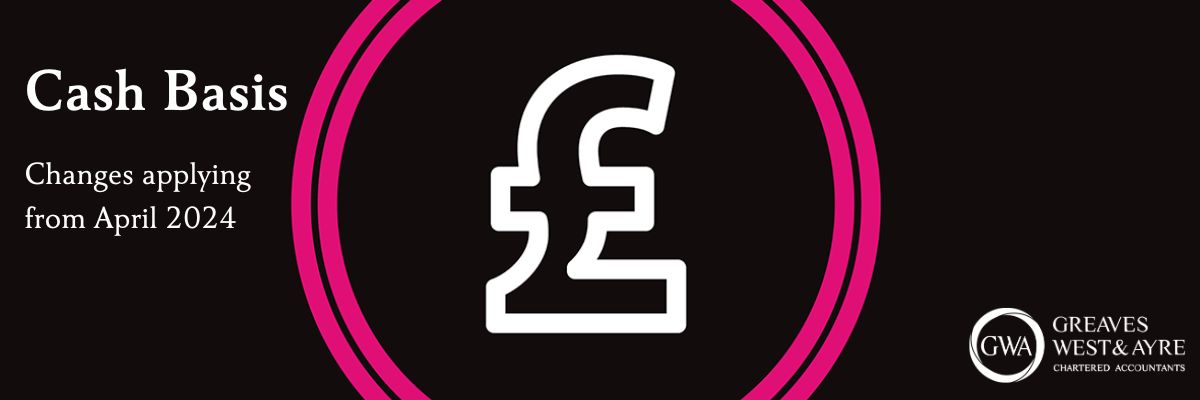Cash Basis – changes applying from April 2024

Changes applying from April 2024
The cash basis is a simpler way of preparing accounts, which takes account only of cash received and cash paid out. Unlike the traditional accruals basis there is no need to match income and expenses to the period to which they relate, or take account of debtors and creditors.
Eligibility:
Currently, Sole Traders and Partnerships (with all individual partners) can elect to use the cash basis if their total business receipts for the Tax Year do not exceed £150,000 (£300,000 for Universal Credit recipients). The limits are proportionally reduced for basis periods less than 12 months, but not increased for longer basis periods.
From April 2024, the turnover threshold of £150,000 will be removed entirely, so even the higher earning self-employed people will be able to use the cash basis.
Ineligibility:
Limited liability partnerships and companies are not eligible to use the cash basis.
There are also some specific types of businesses that cannot use the scheme:
• Lloyd’s underwriters
• farming businesses with a current herd basis election
• farming and creative businesses with a section 221 ITTOIA profit averaging election
• businesses that have claimed business premises renovation allowance
• businesses that carry on a mineral extraction trade
• businesses that have claimed research and development allowance
• dealers in securities
• relief for mineral royalties
• lease premiums
• ministers of religion
• pool betting duty
• intermediaries treated as making employment payments
• managed service companies
• waste disposal
• cemeteries and crematoria
Election and Duration:
Currently an election has to be made to use the cash basis, however, from April 2024; the cash basis will be the default method of calculating trading profits. An election will no longer be required to use the cash basis, and businesses will calculate their trading profits using the cash basis unless they make an election to use the accruals basis.
A new election will be introduced to allow businesses to opt-out of the cash basis and switch to accruals. This election will have effect from the tax year in which it is made onwards but can be withdrawn to allow the business to move back to the cash basis. This legislation will also stop the cash basis default applying to certain types of businesses that are normally excluded from using the cash basis.
Capital Expenditure:
Capital expenditure is generally allowable as a deduction under the cash basis, except for certain capital items such as acquiring or disposing of a business, education and training, acquiring non-depreciating assets, acquiring cars, and acquiring land. Cars continue to be eligible for capital allowances.
Capital Allowances:
Under the cash basis accounting method, Capital Allowances cannot be claimed for expenditure on plant and machinery used for trade purposes. Instead, the actual cost of qualifying plant and machinery is deducted when it is paid. However, cars are an exception to this rule. Despite the cash basis, cars remain eligible for Capital Allowances, meaning their cost can still be claimed as a deduction.
Limitations:
1. Pre 2024, businesses with significant capital needs may have exceeded the £500 limit on allowable interest. However, from April 2024 this restriction is removed allowing the deduction of any amount of interest ‘as long as it is incurred wholly and exclusively for the purposes of the trade’.
2. Capital Allowance adjustments: As per above (Capital Allowances), businesses may still need to make adjustments for capital expenditure on cars if they choose not to use the simplified expenses mileage rate.
3. Lack of choice in Capital Allowances claims: Cash accounting does not provide the option to choose the amount of Capital Allowances claimed. This limitation may negatively impact individuals who make modest profits covered by their personal allowance. Having the ability to choose the amount of Capital Allowances claimed in more profitable years may be preferable.
4. An adjustment is required for a capital asset used for business and private purposes where the proportions of use change. The reduction in business use is treated as a sale of part of the asset at current market value.
5. From April 2024, losses generated can be used in the same way as accruals basis losses. This means that cash basis losses will be able to be set sideways against general income of the same period or carried back to earlier years (including opening year loss relief ), subject to the same general loss relief rules as accruals losses.
6. Farmers’ averaging relief and herd basis rules do not apply to farmers and market gardeners who work out their profits using the cash basis.


